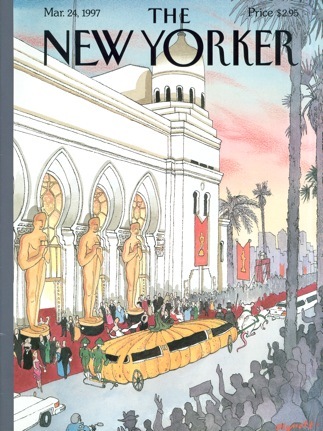Using the Internet to house our work puts it at the mercy of the platform which hosts it.
Masha Yudin stashed this in Communication
Stashed in: Terms, Awesome, New Yorker, Google FAIL
His GIF novels sound fascinating.
During our conversation, Cooper hesitated to describe Google’s erasure of the site as an act of censorship, though he speculates that DC’s was most likely taken down due to content that violated the platform’s terms of service. (He has no idea why his e-mail was also deleted.) Blogger’s content-policy pagelists violations including pedophilia, harassment, copyright infringement, impersonating others, and using the platform “as a way to make money on adult content.” The policy states that, depending on “the severity of the violation,” the platform will choose from a range of actions including deleting the “offending content, blog post or blog” and disabling “the author’s access to his/her Google account.”
Cooper speculates that the objectionable content on DC’s might have been the male-escort ads he finds online, edits a little, and posts for his readers. Cooper has always made sure that the splash page of DC’s warns visitors that the site contains adult content, but the majority of the content he publishes is innocuous. “If you look at what I post about,” he said, “I focus on this book, or I focus on that film. I post about artists, or the latest amusement-park rides, or miniature-golf courses. I mean, that’s what I do. Except for those escort-site posts, I don’t post anything sexual. I never even espouse political views.”
It’s bad enough that the entirety of DC’s might never be recovered, but what’s most devastating to Cooper at the moment is the loss of his just completed “GIF novel,” “Zac’s Freight Elevator,” the third in a series of works he made on the site using only GIFs found online. Thinking of the looping videos as language, he places them together, stacking them or opposing them to create a story—and, in so doing, effectively forging a new form of fiction. Cooper told me that he worked on “Zac’s Freight Elevator” for seven months. “It was going to be my last GIF novel,” he said. “And it’s by far the best one.”
Google’s failure to address Cooper’s problem makes it easy to fear the worst. When I contacted the company’s press department for a statement, my inquiry was met with a perkily unhelpful reply: “Regarding your inquiry, we’re aware of this matter and not able to comment on specific user accounts. Thanks, The Google Press Team.” (In a second message the press team later added that it was unable to discuss the “specific terms of service violations … due to legal considerations.”) I also e-mailed the same Google employee who’d tried to help Cooper, but she answered that she’d been advised by Google to refer all press requests to the press department. Clearly facing a dead end, I reached out for guidance to a friend who is a former Google employee. She guessed that the whole thing was a clerical error of sorts—the result of a policy reviewer who “saw something on the blog they interpreted as out-of-bounds from Google policy and took it down.” The disastrous consequences probably stemmed from “just a stupid mistake,” she said.
Either way, Cooper’s ordeal is a chilling reminder that those of us who use the Internet to house our creative work do so at the mercy of the platforms who host us. In its general terms of service Google states, “We believe that you own your data and preserving your access to such data is important,” and “If we discontinue a Service, where reasonably possible, we will give you reasonable advance notice and a chance to get information out of that Service.” But it also includes a sweeping disclaimer: “We don’t make any commitments about the content within the services, the specific functions of the services, or their reliability, availability, or ability to meet your needs.” Last Friday, Suzanne Nossel, the executive director of the pen American Center, released a public statement supporting Cooper’s appeal for an answer. In an e-mail to me that same day, she outlined the critical tension that exists between artists and online platforms that peddle in privatized public spaces. “Internet companies have found important ways to monetize that creative output and staying power,” she said. “Implicit in this exchange is that people like Dennis Cooper are trusting a platform as the keeper of their creative work. If that trust can be betrayed, especially summarily and without expectation, it breaches the bond.” Cooper says that if he doesn’t hear from Google soon, he’ll have no choice but to sue. He will do so with regret, knowing that a lawsuit will be a terrible drain on his time and resources. But, he said, “I can’t let it go.”











3:07 PM Jul 26 2016